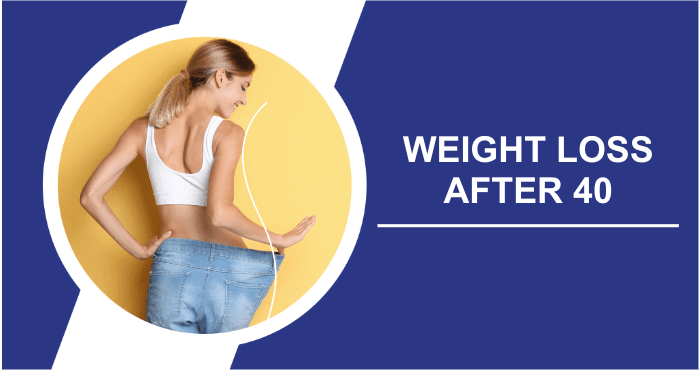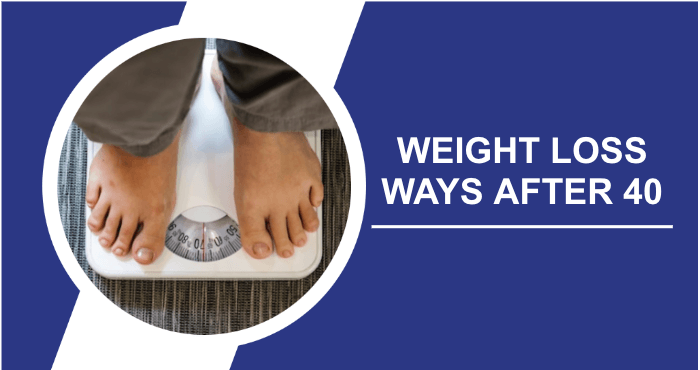Hitting your 40s comes with several benefits, such as increased wisdom, self-awareness, and more confidence. One pitfall is the decline in metabolism, making weight loss and maintenance challenging and tricky. However, it’s not impossible to lose weight after 40. Looking and feeling your best doesn’t have to be overwhelming.
How to lose weight after 40?
Here are our top tips for losing weight after 40:
- Hire a certified personal trainer
- High-intensity interval training
- Stress management and breathing exercises
- A better diet for weight management
- More physical activity
- Increase fibre intake
What Are Common Causes Of Weight Gain In General?
Gaining weight isn’t solely influenced by our choices but rather a mix of various factors. Our contemporary way of living, which is marked by behaviors and sedentary routines, can play a big role in those added pounds. Moreover, stress tends to appear on the scale as it frequently triggers eating habits.
Lack of sleep can also disrupt our hunger hormones, making us more prone to overeating. Genetics also play a role in predisposing some people to gain weight more quickly than others. So when the scales show an increase in weight, it’s usually not just one thing causing it but a complex interplay of these elements affecting our waistlines.
Who Finds It Most Difficult To Lose Weight After 40?
It can be challenging for individuals above 40 to lose weight. As we age, our metabolism slows down, making it more challenging to lose those pounds. Women may experience weight gain during menopause around the belly area. Additionally, our hectic schedules and family obligations can make it more challenging to focus on maintaining habits.
In addition, years of dieting and weight fluctuations can have a lasting effect on our body’s ability to lose weight quickly. However, it’s important to remember that age is one factor among many. With determination, a balanced approach and the right support system, anyone can achieve their weight loss goals – regardless of age.
Looking For Ways To Lose Weight After Turning 40?
Good news awaits regardless of age; achieving weight loss is feasible through embracing a lifestyle centred on eating and consistent physical activity. The initial hurdle typically lies in commencing this journey. Once you overcome that obstacle, progress is within reach. Explore the habits for maintaining a healthy weight beyond the age of 40!
Consider The Benefits Of Consulting With A Certified Trainer
If you’re not achieving the desired outcomes, consulting with an expert might be beneficial, provided your financial circumstances permit. A qualified fitness instructor or licensed nutritionist can guide you in shedding pounds by recommending ways to lower your calorie consumption and boost your calorie burn. Can you explain how this procedure functions?
A crucial aspect of the effectiveness of any exercise programme is your technique and motivation. While choosing to go may seem less intrusive or embarrassing, these experts are trained to identify any obstacles hindering your progress. Remote personal trainers can be an option if you have a busy schedule or cannot leave your home for various reasons.
HIIT (High-intensity interval training)
Looking to boost your exercise regimen without altering your diet? Consider ramping up the intensity of your workouts through high-intensity interval training, commonly referred to as HIIT. This method is recognized for its effectiveness in burning calories efficiently and producing noticeable outcomes. While HIIT sessions may pose a challenge, research indicates their potential to reduce body fat in the midsection.
Adding resistance training to your routine can further improve insulin sensitivity, help manage blood sugar levels, and even control cravings. So, if you’re looking for a way to boost your fitness journey, try HIIT. It’s time-efficient and offers a range of benefits to help you achieve your goals.
Stress Management And Breathing Techniques
Is yoga effective for losing weight? Although it may not be an efficient way to burn calories, participating in stretching and breathing exercises through various types of yoga can improve your overall health and help with stress relief. These benefits can also affect our hormones and habits, which can play a role in managing weight.
When we experience relaxation and a sense of ease, we are more likely to avoid eating and focus on what is really important in our lives. Sometimes, managing stress can be as simple as dedicating a day to self-care. Taking a bath, sipping a soothing cup of tea or enjoying an evening at the movies can all contribute to the success of your weight loss journey, regardless of your age.
Achieving Weight Management Requires Optimizing Your Diet
Enjoying a meal is truly a unique experience. However, it’s crucial to be mindful of our food choices to maintain weight. Creating a meal prep plan can have a significant impact, particularly for those juggling work commitments or caring for family members.
This approach ensures that you always have nutritious options on hand and helps you avoid choices such as frozen meals, sugary treats, and fried foods packed with refined carbohydrates. For those with the luxury of time, daily cooking is an option.
Ensure that protein, good fats, and whole grains are included in every meal to stay full and focused all day. When you feel like snacking, choose options like yogurt, nuts, fresh fruit, or sliced veggies to enjoy a tasty treat without exceeding your daily calorie limit.
Get More Physical Activity
One way to prevent weight gain is to increase physical activity and maintain a healthy calorie deficit. You don’t necessarily need a gym membership to incorporate exercise into your routine, especially if you have family responsibilities or engaging hobbies that keep you active. If you’re not an athlete, there are still plenty of options for low-impact fitness classes, such as Zumba and spin classes, and group activities, such as walking.
Engaging in these activities offers exercise choices suitable for the community and can enhance your physical appearance and health. Moreover, routine chores, like cleaning the house and tending to the garden, can also elevate your heart rate, promoting an active way of life.
While online fitness videos and virtual fitness enthusiasts can be a source of motivation and workout ideas, you don’t have to become a fitness expert to burn fat. Even something as simple as walking or jogging around your neighborhood can help build lean muscle as your metabolism naturally slows down with age.
Optimize Fiber Intake
Upping your fiber consumption can boost your well-being. The advantages of enhancing your fiber intake are noteworthy. They have a wide-ranging impact. Irrespective of age, prioritizing fiber in your diet is crucial for maintaining good health.
The American Heart Association recommends eating 25 to 30 grams of fibre a day to help with weight management and overall health. Research shows that this fibre can come not only from whole foods but also from supplements containing substances such as psyllium husk. These supplements offer a way to increase fibre in a variety of foods, including smoothies and baked goods.
Reasons Behind Weight Gain After Reaching The Age Of 40
As you age, it is typical to experience weight gain even if you have stuck to a routine for years. Several factors play a role in this phenomenon, and not all of them are entirely under your influence.
Weight gain isn’t just about storing more fat; it can also be related to changes in weight distribution and the tendency to lose muscle mass as you age. These factors can make it challenging to maintain a healthy diet and lifestyle. In the following paragraphs, we’ll look at the most common causes of weight gain in women in their 40s. Some may be obvious, while others may come as a surprise.
Menopause
After turning 40, hormonal shifts and changes in weight go hand in hand. Fluctuations in hormones can lead to increases in weight. Studies indicate that life transitions can cause alterations that make individuals more prone to gaining weight around the midsection. This occurrence is commonly associated with a decline in estrogen levels among women and a decrease in testosterone production among men.
Genetic Composition
The role of genetics in the accumulation of fat and increased body mass with age cannot be overlooked. In fact, researchers have identified nearly 500 genes associated with obesity, both in adulthood and later in life.
Certain specialists suggest that, in some instances, our genetic makeup might play a more significant role in weight gain than our dietary choices and exercise routines. While it’s not a challenge, it’s definitely a factor worth taking into account.
Changes in Lifestyle
As we get older, we often tend to relax and take life easier. But this shouldn’t be at the expense of our wellbeing. Middle age and the following golden years should be filled with happiness and tranquillity.
Earlier, I highlighted how less movement can cause muscles to shrink, which may decrease our activity levels without us noticing. Additionally, having an income and better food availability might tempt us to adopt more lavish eating habits as we age.
A Slower Metabolism
When women reach the age of 40 and beyond, their metabolism tends to slow down compared to premenopausal levels. This means that their bodies require fewer calories to function at rest, which can lead to weight gain and a tendency to accumulate abdominal fat. These changes in metabolism are influenced by factors such as changes in body composition, including an increase in body fat and a decrease in muscle mass.
Changes In Body Composition
Managing your weight involves more than adjusting what you eat and how active you are. As we age, our bodies naturally undergo changes, like losing muscle mass. Decreased neuromuscular function can hinder weight loss efforts during workouts or daily tasks.
Our behaviour naturally adapts to these changes. We adapt to our ‘new’ bodies, which means we burn fewer calories than before. Therefore, as we age, it is important to consider methods that help maintain muscle mass to stabilise metabolism and manage weight effectively.
Are You Finding It Difficult To Lose Weight As You Get Older?
We hear you. Acknowledge your worries. If you’re dissatisfied with your body and desire transformation, we recommend pausing to evaluate the circumstances, uncover any concerns and contemplate seeking expert guidance if you’re uncertain about the next steps. Beginning a weight loss endeavor may appear overwhelming initially.
However, by focusing on eating healthy, leading an active lifestyle and cherishing moments of happiness with your loved ones, you can begin your journey towards a healthier way of life. We believe that if you really give this approach a chance, you will see positive changes in your life.
Are There Supplements That Can Help Lose Weight Over 40?
When it comes to using weight loss supplements past the age of 40, it’s crucial to set expectations. While there isn’t a solution, certain supplements can support a healthy lifestyle. For instance, incorporating omega-3 fatty acids from fish oil into your routine may aid in reducing inflammation and enhancing metabolism.
Vitamin D plays a role in maintaining muscle mass and regulating appetite. Probiotics can help maintain good gut health, which can impact weight management. However, it’s important to consult a healthcare professional before considering any supplements. Let’s face it: the most effective approach is to eat a balanced diet and stay physically active, regardless of age.
What Are The Possible Side Effects Of Weight Loss After 40?
Weight loss can have results, especially for individuals over 40. However, it’s crucial to consider the drawbacks. Rapid weight loss can sometimes result in muscle depletion and decreased energy levels. Additionally, individuals may observe alterations in skin elasticity, which can contribute to sagging. To mitigate these consequences, adopting an approach to weight loss is essential.
In addition, extreme dieting or excessive exercise can lead to fatigue, mood swings and nutrient deficiencies. While shedding pounds is a great goal, it’s equally important to prioritise your overall health and well-being by adopting a balanced and sustainable approach to weight loss.
Frequently Asked Questions
Why does it feel more challenging to shed pounds once we reach our forties?
As we age, our metabolism tends to decrease, and hormonal shifts like menopause can impact how our bodies store fat. However, don’t be discouraged by this! By making some adjustments to your lifestyle, you can still see improvements.
Is it possible to build muscle and boost metabolism during midlife?
Absolutely! By incorporating resistance training and staying physically active, you can increase your muscle mass, which supports a healthier metabolism.
How important is a balanced diet for managing weight after age 40?
Maintaining a rounded diet is crucial. It’s essential to prioritize dense foods, lean protein sources, good fats and fiber to support a healthy weight and overall wellness.
Do you have any tips for staying motivated throughout this weight management journey?
Discover activities that you enjoy and set realistic goals. Celebrate small victories along the way. It’s also helpful to surround yourself with a community that encourages and holds you accountable.
Can I embark on this weight loss journey without guidance?
While seeking advice from experts can be beneficial, it’s not a must. Begin by incorporating adjustments into your daily routine and gradually expand on them based on what suits you best. Nevertheless, it’s wise to consult with a healthcare provider when needed.
The Bottom Line
As you age, fat tissues start gathering around the centers of your body. Women nearing menopause usually have their weight loss challenged because their bodies now produce less estrogen, which influences weight. Still, you can lose weight even after 40. Simply incorporate some of the tips shared in the article. Overall, embrace each stage of your life as they offer the potential for a rewarding life regardless of your age.
Resources
- Kim, J.Y. (2021). “Optimal Diet Strategies for Weight Loss and Weight Loss Maintenance.” Journal of Obesity & Metabolic Syndrome, 30(1), pp. 20–31. doi: Link.
- Boutcher, S.H. (2011). “High-Intensity Intermittent Exercise and Fat Loss.” Journal of Obesity, 2011, pp. 1–10. doi: Link.
- Howarth, N.C., Saltzman, E., and Roberts, S.B. (2009). “Dietary Fiber and Weight Regulation.” Nutrition Reviews, 59(5), pp. 129–139. doi: Link.
- Karvonen-Gutierrez, C. and Kim, C. (2016). “Association of Mid-Life Changes in Body Size, Body Composition, and Obesity Status with the Menopausal Transition.” Healthcare, 4(3), p. 42. doi: Link.
- St-Onge, M.-P. and Gallagher, D. (2010). “Body composition changes with aging: The cause or the result of alterations in metabolic rate and macronutrient oxidation?” Nutrition, 26(2), pp. 152–155. doi: Link.
- Keller, K. and Engelhardt, M. (2014). “Strength and muscle mass loss with aging process. Age and strength loss.” Muscles, ligaments and tendons journal, 3(4), pp. 346–350. Available at: Link.
- Morrison, S. and Newell, K.M. (2012). “Aging, Neuromuscular Decline, and the Change in Physiological and Behavioral Complexity of Upper-Limb Movement Dynamics.” Journal of Aging Research, 2012, pp. 1–14. doi: Link.
- Gabrielli, A.P., Manzardo, A.M., and Butler, M.G. (2017). “Exploring genetic susceptibility to obesity through genome functional pathway analysis.” Obesity, 25(6), pp. 1136–1143. doi: Link.
Mark Willson, holding a Ph.D., functions as a psychotherapist in Washington, D.C. His specialized fields encompass addiction, anxiety, depression, as well as sexuality and interpersonal connections. Dr. Willson holds the distinction of being a diplomat for the American Board of Addiction and Anxiety, further serving as a certified counselor and addiction specialist.
Aside from his personal professional endeavors, Dr. Wilson has engaged in roles as an author, journalist, and creator within substantial medical documentary projects.
Isabella Clark, Ph.D., held the position of a professor within Emory University’s School of Medicine, working in the Department of Mental Health and Nutrition Science. Alongside this role, she served as a research associate affiliated with the National Research Center. Dr. Clark’s primary area of research centers on comprehending the mechanisms through which adverse social encounters, encompassing prolonged stress and traumatic exposure, contribute to a spectrum of detrimental mental health consequences and coexisting physical ailments like obesity. Her specific focus lies in unraveling the reasons behind the varying elevated susceptibility to stress-linked disorders between different genders.






